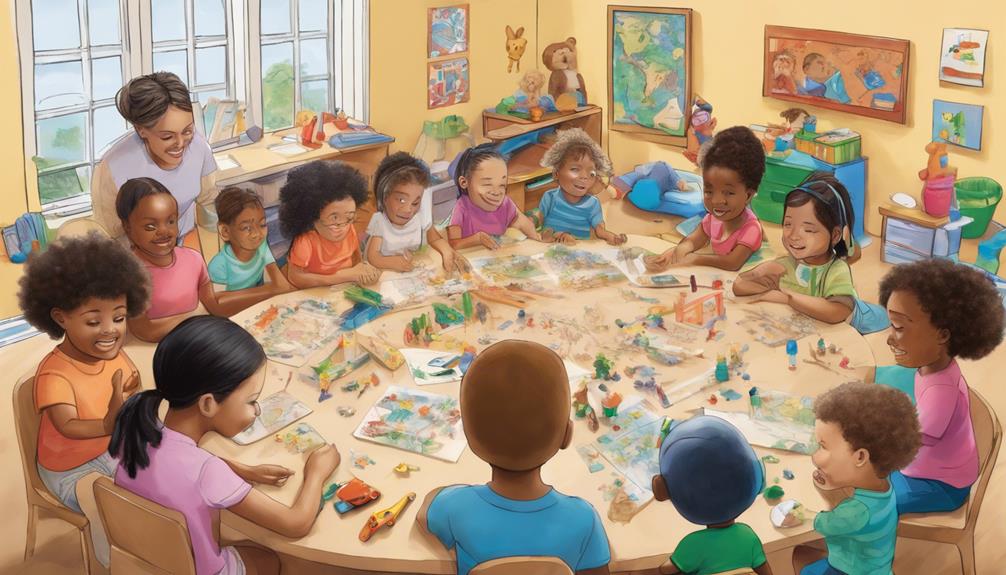So, are you suggesting that there are ten magical techniques to help children cope with divorce? Quite intriguing, isn’t it?
Well, let's just say that the insights shared in this seminar might just be the lifeline parents need to navigate the turbulent waters of divorce with their children.
Wouldn't you want to know how to ease the emotional burden on your little ones during such a challenging time?
Key Takeaways
- Tailor communication to children's understanding levels.
- Provide stability through consistent routines.
- Offer emotional support and validation.
- Seek guidance from support networks for positive adjustment.
Understanding Children's Emotions
When facing divorce, understanding children's emotions is crucial for providing them with the necessary support and guidance. Divorce means significant changes for the entire family, especially for children who may struggle to comprehend the reasons behind it. Younger children, such as preschoolers and young school-age kids, may focus on the practical aspects of divorce, like where they'll live or who'll take care of them. School-age children, on the other hand, might seek explanations for why the divorce is happening. Adolescents may require more tailored information, emphasizing honesty while also being mindful of the details shared.
It's essential to recognize that divorce can evoke a range of emotions in children, from sadness and worry to anger and even behavioral changes. As a family, it's crucial to encourage open communication, provide reassurance and stability, and maintain consistent routines. Seeking professional counseling when needed can also offer additional support during this challenging time. By acknowledging and addressing children's emotions, we can help them navigate the complexities of divorce with understanding and care.
Effective Communication Strategies
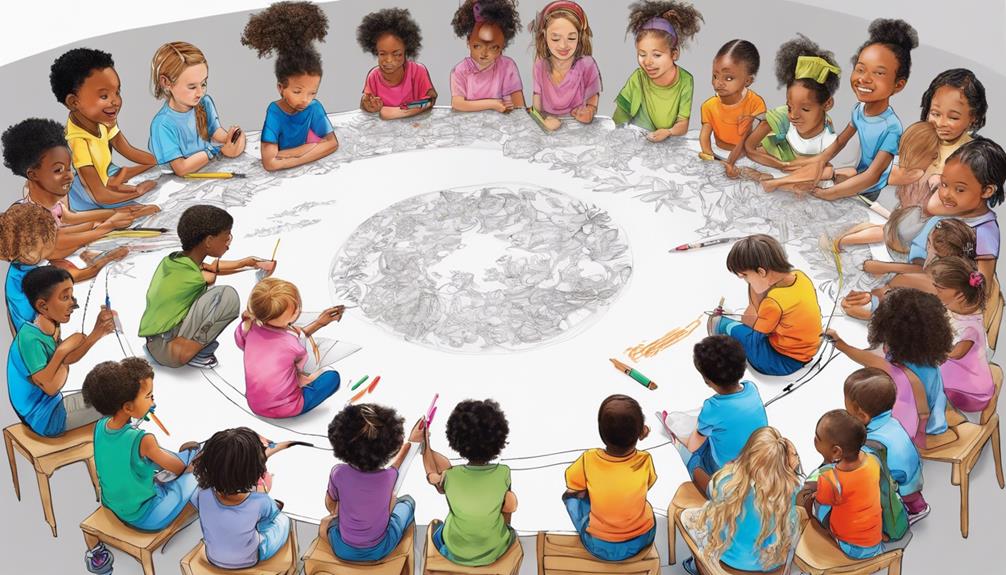
We understand the importance of honest conversations and open dialogue when helping children cope with divorce.
By encouraging communication that's tailored to their understanding, we can provide the reassurance and stability they need during this challenging time.
Let's explore how effective communication strategies can support children through family transitions.
Honest Conversations With Kids
How can we ensure that our conversations with children about divorce are honest, comforting, and age-appropriate? When helping children navigate through the complexities of divorce, our words hold immense power.
Here are three key strategies to communicate effectively during such challenging times:
- Be Honest: Speak truthfully in a way that children can understand, avoiding unnecessary details but providing clear explanations.
- Offer Reassurance: Comfort children by emphasizing your continued love for them and reassuring them that the divorce isn't their fault.
- Create a Safe Space: Encourage open dialogue, listen actively to their feelings, and answer their questions honestly to help them process their emotions.
Encouraging Open Dialogue
Encouraging open dialogue with children during divorce is crucial for fostering understanding and emotional support. By providing a safe space for children to express their feelings and actively listening to their concerns, parents can help them cope with the changes. Honest yet age-appropriate explanations about the divorce can aid children in making sense of the situation, while establishing a routine for open communication can make them feel supported and heard throughout the challenging transition. Here is a table summarizing effective communication strategies for helping children cope:
| Effective Communication Strategies |
|---|
| Provide a safe space for children to express their emotions |
| Actively listen to children's concerns and feelings |
| Offer honest but age-appropriate explanations about the divorce |
Establishing a Stable Routine
As we navigate the challenges of divorce with our children, establishing a stable routine can be a beacon of comfort and familiarity for them.
Consistent daily schedules, especially with predictable bedtime routines, can provide a sense of security during this tumultuous time.
Consistent Daily Schedule
Establishing a consistent daily schedule post-divorce is crucial for helping children feel secure and stable during this period of change. Here are three key ways to help your child through this process:
- Set Regular Meal Times: Having consistent meal times provides children with structure and comfort. It gives them something to look forward to each day and helps regulate their energy levels.
- Designate Homework Hours: Establishing a specific time for homework helps kids focus and creates a routine around their academic responsibilities. It also allows them to feel more in control of their tasks.
- Include Play and Relaxation: While routines are important, don't forget to incorporate play and relaxation into their schedule. Allowing time for fun activities and unwinding supports their overall well-being during this challenging time.
Predictable Bedtime Routine
During times of divorce, ensuring a consistent and predictable bedtime routine for children is crucial in providing them with stability and a sense of security. Children thrive on routine, especially during challenging transitions like divorce. By maintaining a set bedtime ritual, children can feel a sense of normalcy and comfort, helping them navigate the changes more smoothly.
Research suggests that a structured bedtime routine can lead to improved sleep quality for children, which is vital for their emotional well-being during this tumultuous time. This predictability not only aids in reducing anxiety and stress but also creates a soothing atmosphere for children to relax and unwind, fostering better sleep patterns and emotional regulation.
Prioritizing a bedtime routine can offer children the stability and reassurance they need to cope effectively with the changes brought about by divorce.
Providing Emotional Support

In supporting children through divorce, our focus is on providing the emotional comfort and understanding they need during this challenging period of adjustment. Here are three essential ways to offer emotional support to children during divorce:
- Listen and Validate: Children may experience a range of emotions like loss, confusion, and sadness. By actively listening to their feelings and validating their experiences, we can help them feel understood and supported in this difficult time.
- Encourage Communication: Foster open communication where children can freely express their feelings and concerns. Building a positive relationship based on trust enables children to feel secure and helps them navigate the changes more effectively.
- Maintain Stability: Keeping routines and stability in their daily lives provides a sense of predictability and comfort. Consistency offers children a safe anchor amidst the uncertainties of divorce, aiding in their adjustment process.
Encouraging Expression Through Art

To help children cope with divorce, one impactful way is by encouraging them to express their emotions through art. Art therapy provides a safe space for children to creatively explore and process their feelings during this challenging time. Through drawing, painting, and other art activities, children can communicate non-verbally and delve into their inner world in a supportive environment. This form of expression can significantly benefit their mental health by promoting healing, reducing stress, and building resilience. Art therapy sessions are tailored to each child's unique needs, offering a personalized approach to coping with the emotional impact of divorce.
| Benefits of Encouraging Artistic Expression | |
|---|---|
| Provides a safe outlet for emotions | Promotes healing and reduces stress |
| Allows non-verbal communication | Fosters resilience in children |
Building a Strong Support Network
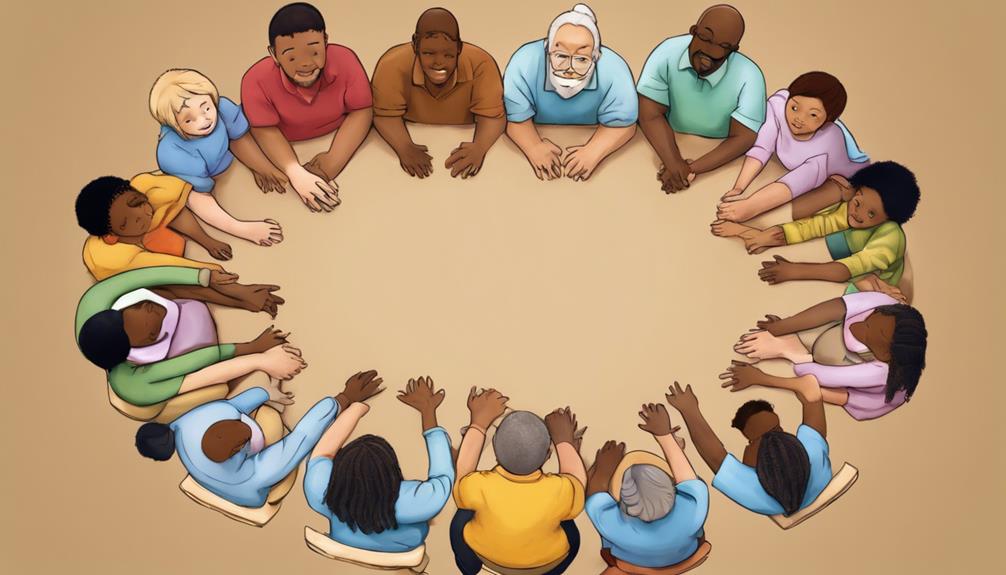
We understand how crucial it's for children to have a strong support network during a divorce. Building connections with family, friends, and professionals can provide the necessary emotional and mental support.
Encouraging open communication within this network can help children express their feelings and navigate through this challenging time with guidance.
Importance of Connections
Building a strong support network is essential for children going through a divorce, providing them with the understanding, security, and stability needed during this challenging time.
Here are three key reasons why connections are crucial for children coping with divorce:
- Emotional Support: Supportive relationships with family, friends, and professionals offer children a safe space to express their feelings and receive comfort.
- Guidance: Connections provide children with guidance on how to navigate the changes and uncertainties that come with divorce.
- Stability: Strong support networks create a sense of predictability and consistency for children amidst the upheaval of divorce, helping them feel more secure and less isolated.
These connections play a vital role in helping children adjust positively to the challenges divorce brings.
Encouraging Open Communication
Establishing open lines of communication with children during divorce is essential for fostering trust and emotional resilience. It's crucial to create a safe environment where children feel comfortable expressing their thoughts and emotions about the changes happening within the family.
Encouraging open dialogue allows children to understand the transition to a new family structure and feel supported through the process. By actively listening to their concerns and providing reassurance, parents can help children navigate the challenges of divorce with more ease.
Open communication fosters a sense of security and stability, helping children adjust to the new family dynamics more effectively. Building a strong support network that prioritizes honest conversations can empower children to cope positively during this period of change.
Seeking Professional Guidance
Seeking professional guidance during a divorce can provide invaluable support and assistance for both parents and children navigating through this challenging time. Therapists and counselors offer specialized tools and advice that can help families cope with the emotional toll of divorce and develop effective communication strategies.
Here are three ways professional guidance can benefit families:
- Tailored Support: Professionals can tailor their approach to address the unique needs of each family member, ensuring personalized care.
- Coping Strategies: Therapists can equip parents and children with practical coping strategies to manage stress and emotions during the divorce process.
- Healthy Adjustment: Professional support can aid children in processing their feelings and adjusting to the changes in a healthy and constructive manner.
Fostering a Positive Co-Parenting Environment

Creating a harmonious co-parenting atmosphere is vital for children's emotional well-being during and after a divorce. Research underscores the impact of parental conflict on children's psychological health, highlighting the significance of fostering a positive co-parenting environment. Cooperation between parents is key, as children suffer from witnessing parental disputes. Maintaining a respectful, businesslike approach to co-parenting can reduce conflict, providing a positive space for children. It's crucial to shield children from being involved in parental disagreements to ensure emotional stability and mental well-being. Increasing contact with both parents generally benefits children, underscoring the importance of a supportive co-parenting relationship.
| Tips for Fostering a Positive Co-Parenting Environment |
|---|
| Maintain a respectful and businesslike demeanor. |
| Keep children out of the middle of parental conflicts. |
| Increase contact with both parents for children's benefit. |
Seeking Professional Counseling When Needed

When children are navigating the challenges of divorce, reaching out to professional counseling can provide invaluable support and guidance. Here are three reasons why seeking professional counseling when needed is crucial for children going through divorce:
- Emotional Processing: Professional therapists are trained to help children process their emotions in a healthy way, aiding them in understanding and coping with the changes in their family dynamic.
- Safe Space: Counseling offers a safe and confidential environment for children to express their feelings, fears, and concerns without judgment, allowing them to explore their emotions freely.
- Building Coping Strategies: Therapists can assist children in developing effective coping mechanisms and strategies to navigate the challenges that arise during the divorce process, empowering them to adapt and thrive despite the circumstances.
Seeking professional counseling ensures that children have access to the support and guidance they need to navigate the complexities of divorce with resilience and emotional well-being.
Addressing Behavioral Changes Proactively
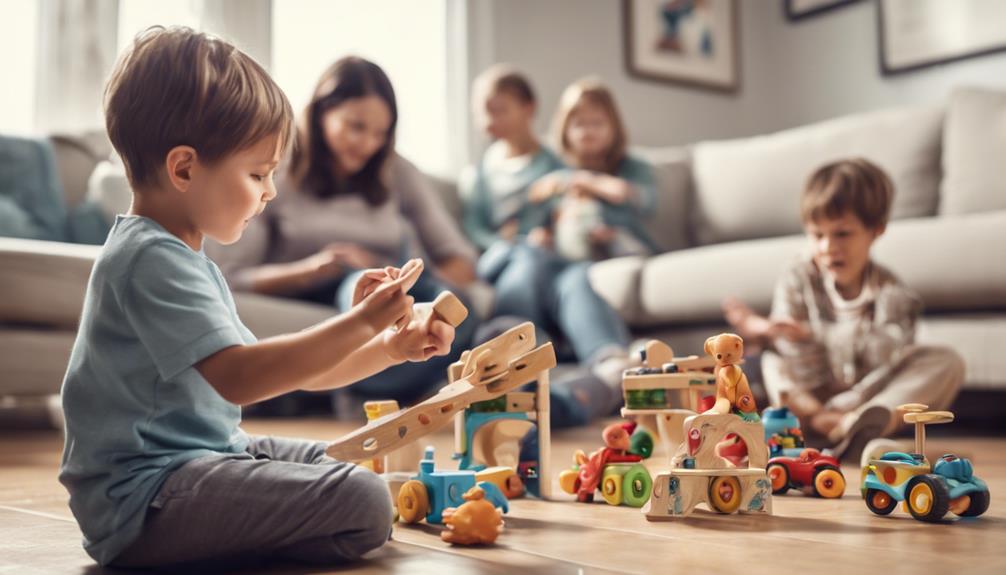
Addressing the behavioral changes that children may exhibit post-divorce requires proactive strategies and understanding their emotional needs. It's essential to help children navigate through this challenging time with patience and support.
Behavioral changes such as aggression, withdrawal, anxiety, or acting out are common responses to the stress of divorce. To help them cope, open communication, reassurance, and maintaining consistent routines can make a significant difference. These strategies provide children with a sense of stability and security during a period of uncertainty.
Promoting Self-Care for Children
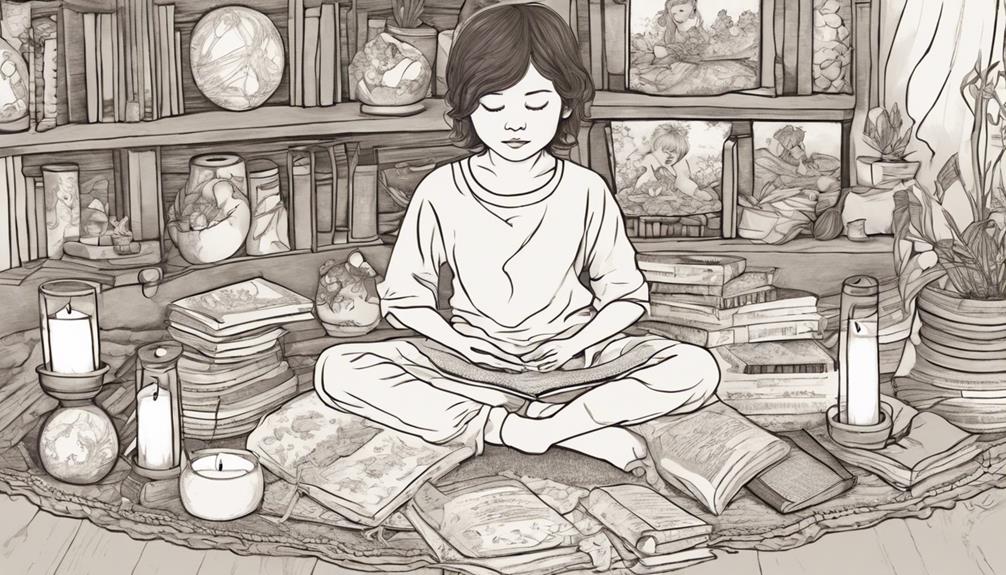
Navigating through the behavioral changes post-divorce, it's crucial to promote self-care for children as a way to empower them in managing their stress and emotions. Encouraging self-care practices not only helps children cope with divorce-related stress but also fosters their emotional well-being.
Here are three ways that providing parents can promote self-care for children:
- Teach Self-Soothing Techniques: By teaching children techniques like deep breathing, mindfulness, or visualization, parents can empower them to manage their feelings during the transition effectively.
- Encourage Self-Expression: Providing opportunities for self-expression through art, journaling, or physical activities allows children to express themselves and process their emotions in a healthy way.
- Promote Healthy Habits: Supporting children in maintaining healthy habits such as regular exercise, proper nutrition, and sufficient sleep can enhance their resilience and overall well-being during this challenging time.
Frequently Asked Questions
How Can I Help My Child Cope With Separation and Divorce?
We can help our children cope with separation and divorce by providing reassurance, encouraging open communication, maintaining consistent routines, seeking professional counseling if needed, and fostering positive relationships with both parents. Let's support them through this challenging time.
What Is Most Important in Helping Children Cope With Divorce?
In helping children cope with divorce, the most important thing is providing love and stability. By being consistent, open, and supportive, we can help them navigate this tough time, reassuring them that they are not alone.
How Do Kids Cope After Divorce?
Kids cope after divorce by expressing emotions, seeking support, and maintaining routines. We help them by listening, providing stability, and fostering positive relationships. Their resilience shines when we offer love, understanding, and consistency during challenging times.
How Can I Help My Grown Child Through Divorce?
Here's how we can help our grown child through divorce: actively listen, validate emotions, encourage therapy, provide reassurance and stability, maintain open communication. Together, we can support them during this challenging time.
Conclusion
In conclusion, it's important to remember that children are deeply affected by divorce and need our support.
Did you know that children of divorced parents are more likely to experience academic difficulties?
By prioritizing their emotional well-being, maintaining open communication, and seeking professional help when needed, we can help children navigate this challenging time with resilience and strength.
Let's continue to be there for our children as they cope with the changes that come with divorce.

